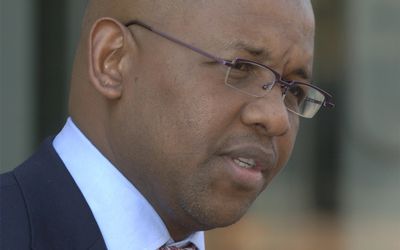THE three main parties contesting Gauteng, South Africa’s economic heartland, on Wednesday faced off in an election debate at the University of Johannesburg.
The African National Congress’s (ANC’s) Gauteng chief whip Brian Hlongwa came head to head with the Democratic Alliance’s (DA’s) premier candidate Mmusi Maimane as well as Economic Freedom Fighters (EFF) premier candidate Dali Mpofu.
Gauteng is expected to be one of the highly contested provinces in the upcoming May 7 national election. Polls suggest that the ANC faced the threat of losing support in the province, fuelling speculation of a possible coalition government in the province.
In 2009, the ANC won 47 of the 73 seats in the Gauteng legislature. The DA won 16, while the EFF will be contesting the elections for the first time.
Wednesday’s debate, hosted by Power FM’s Siki Mgabadeli, had been intended to focus on unpacking the socioeconomic issues in Gauteng, however, for the most part it became a contest between the DA-run Western Cape and ANC-run Gauteng, almost squeezing the EFF out of the debate.
Mr Hlongwa said the ANC was still strong and would continue to lead the province despite the negative polls. He said it was unlikely that the ANC would get below 50% because the party had successfully used the campaign season to clarify issues that voters were not satisfied with. "Gauteng is not up for grabs and the ANC will still be here," Mr Hlongwa said.
Mr Maimane said since 2009 there have been issues that have frustrated Gauteng residents because of the ANC’s failures in government. He said the DA had demonstrated where it governs, in the Western Cape and Midvaal municipality in Gauteng, that good governance could enable economic growth and job creation.
Mr Maimane, in what was largely seen to be a US style of campaigning, travelled 30,000km across Gauteng in a campaign bus in a bid to win votes for the DA. A latest Ipsos poll in the Sunday Times last weekend placed the DA at about 30% in Gauteng.
Mr Hlongwa said the Western Cape’s economy was like a "spaza shop" compared to Gauteng — which contributes close to 37% of the national gross domestic product and is home to a third of the country’s population.
Mr Mpofu, whose EFF does not have experience in government, said the ANC’s and DA’s gloating about their record in government "meant little when there are people who do not have services and their dignity being assaulted". He said the notorious "poo protests" in Western Cape showed deep levels of discontent with the delivery of government.
He said the ANC’s "confidence" ahead of the elections was just pre-election posturing because even the party’s internal polls had consistently placed them at about 50%. However, said Mr Mpofu, the polls were wrong regarding the measure of support for the EFF — also placed at below 5% by the recent Ipsos Sunday Times poll. "They do not go to the kind of places we go to." He said the EFF addressed multitudes on daily basis in places where pollsters do not reach. "People are enthusiastic about our message," he said.
On weekend reports of a likely coalition between the DA and EFF in Gauteng, Mr Mpofu said there were no coalition talks and it would be presumptuous to do so. He said "coalitions are forced by electorate. It’s only the results that can say who we speak to".
He said the EFF would only talk to people who would accept the fundamentals of its policy, including nationalisation of the mines and land expropriation without compensation. Mr Mpofu said the DA and ANC were more likely to be bed partners because both parties agreed on the National Development Plan as a framework of government policy.
Political analyst Chris Landsberg summed up the debate as "a beauty contest" between the Western Cape and Gauteng.

Advocate Dali Mpofu. Picture: SOWETAN
THE three main parties contesting Gauteng, South Africa’s economic heartland, on Wednesday faced off in an election debate at the University of Johannesburg.
The African National Congress’s (ANC’s) Gauteng chief whip Brian Hlongwa came head to head with the Democratic Alliance’s (DA’s) premier candidate Mmusi Maimane as well as Economic Freedom Fighters (EFF) premier candidate Dali Mpofu.
Gauteng is expected to be one of the highly contested provinces in the upcoming May 7 national election. Polls suggest that the ANC faced the threat of losing support in the province, fuelling speculation of a possible coalition government in the province.
In 2009, the ANC won 47 of the 73 seats in the Gauteng legislature. The DA won 16, while the EFF will be contesting the elections for the first time.
Wednesday’s debate, hosted by Power FM’s Siki Mgabadeli, had been intended to focus on unpacking the socioeconomic issues in Gauteng, however, for the most part it became a contest between the DA-run Western Cape and ANC-run Gauteng, almost squeezing the EFF out of the debate.
Mr Hlongwa said the ANC was still strong and would continue to lead the province despite the negative polls. He said it was unlikely that the ANC would get below 50% because the party had successfully used the campaign season to clarify issues that voters were not satisfied with. "Gauteng is not up for grabs and the ANC will still be here," Mr Hlongwa said.
Mr Maimane said since 2009 there have been issues that have frustrated Gauteng residents because of the ANC’s failures in government. He said the DA had demonstrated where it governs, in the Western Cape and Midvaal municipality in Gauteng, that good governance could enable economic growth and job creation.
Mr Maimane, in what was largely seen to be a US style of campaigning, travelled 30,000km across Gauteng in a campaign bus in a bid to win votes for the DA. A latest Ipsos poll in the Sunday Times last weekend placed the DA at about 30% in Gauteng.
Mr Hlongwa said the Western Cape’s economy was like a "spaza shop" compared to Gauteng — which contributes close to 37% of the national gross domestic product and is home to a third of the country’s population.
Mr Mpofu, whose EFF does not have experience in government, said the ANC’s and DA’s gloating about their record in government "meant little when there are people who do not have services and their dignity being assaulted". He said the notorious "poo protests" in Western Cape showed deep levels of discontent with the delivery of government.
He said the ANC’s "confidence" ahead of the elections was just pre-election posturing because even the party’s internal polls had consistently placed them at about 50%. However, said Mr Mpofu, the polls were wrong regarding the measure of support for the EFF — also placed at below 5% by the recent Ipsos Sunday Times poll. "They do not go to the kind of places we go to." He said the EFF addressed multitudes on daily basis in places where pollsters do not reach. "People are enthusiastic about our message," he said.
On weekend reports of a likely coalition between the DA and EFF in Gauteng, Mr Mpofu said there were no coalition talks and it would be presumptuous to do so. He said "coalitions are forced by electorate. It’s only the results that can say who we speak to".
He said the EFF would only talk to people who would accept the fundamentals of its policy, including nationalisation of the mines and land expropriation without compensation. Mr Mpofu said the DA and ANC were more likely to be bed partners because both parties agreed on the National Development Plan as a framework of government policy.
Political analyst Chris Landsberg summed up the debate as "a beauty contest" between the Western Cape and Gauteng.














 News, views and analysis of South Africa's national and provincial elections on May 7 2014
News, views and analysis of South Africa's national and provincial elections on May 7 2014







Change: -0.47%
Change: -0.57%
Change: -1.76%
Change: -0.34%
Change: 0.02%
Data supplied by Profile Data
Change: -1.49%
Change: -0.37%
Change: -0.47%
Change: 0.00%
Change: -0.49%
Data supplied by Profile Data
Change: 1.22%
Change: 1.55%
Change: 1.07%
Change: 0.81%
Change: 1.28%
Data supplied by Profile Data
Change: 0.10%
Change: -0.73%
Change: -0.07%
Change: -1.21%
Change: -1.13%
Data supplied by Profile Data